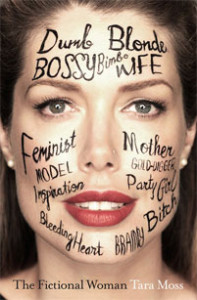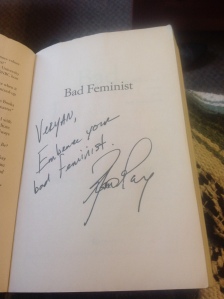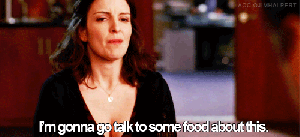Feminism is a tricky topic to write about. For some unknowable reason, it is still controversial to declare oneself a feminist, particularly if you are a public figure. To do so is to open yourself up to attacks from men and women – you’re a man-hater, a misandrist. You are told that we don’t need feminism any more – the gender wars are over. What about racism, poverty, homophobia? Why don’t you focus on those problems? Why don’t you get back in the kitchen where you belong?
So at the outset, I should say that Tara Moss deserves a lot of praise for her long and very public stance as a feminist, and her willingness to speak up about issues that are important to her, not least putting them in her latest book The Fictional Woman. I just wish that I liked said book more than I did.
It’s not that the book was bad. Moss is a good writer, and has a pretty engaging style. The early chapters, detailing her teen years and modelling career, and her experiences as a crime author, were interesting, funny and at times, heartbreaking. But after four chapters, Moss veers from biography into feminist theory and think-pieces and, unfortunately, I found the rest of the book pretty boring and pedestrian.
I call myself a feminist – I believe that women are in every way the equal of men, and should be treated, paid and spoken to as if they are. In The Fictional Woman Moss discusses, among other things, body image, gender representation, beauty myths, parenting, ageism and control of women’s bodies – all things I feel strongly about. The thing is, these are also all things that I’ve read hundreds, nay, thousands of words about elsewhere. There’s nothing new here. Moss articulates her points well, she presents evidence and statistics when necessary, but she doesn’t say anything new, and she doesn’t present things in a particularly new or engaging way. There’s not a lot to differentiate between chapters 5-18 of The Fictional Woman and a column on Daily Life, or Jezebel, or The Mary Sue, or a opinion piece in The Guardian .or The Conversation. I found it hard to finish this book because I’ve read it all before.
It must be said, I think at least part of my reaction is part of a wider exhaustion that we are still talking about this stuff. It’s dispiriting and tiring to read yet another example of how women are harassed on the street, to hear about near misses on dark streets, to have the statistics of pay gaps, female representation and voice presented once again. I seriously don’t understand how any of this is still a thing.
Actually, I do understand, I just think it’s rubbish.
Obviously the points Moss makes are important, and need to be talked about. But I don’t think she brings anything much to dicussion, other than to reinforce that yes, these things are bad, lets do something about them.
It’s interesting to compare The Fictional Woman with another ‘feminist’ book I read recently, Roxane Gay‘s Bad Feminist. Like Tara Moss, Roxane Gay writes about women, gender, body image, eating disorders, gender in pop culture (she also writes about Scrabble, in a screamingly funny essay that had me snorting on the train as I read it). But whereas I had to force myself to finish The Fictional Woman, I couldn’t put Bad Feminist down. I read it compulsively, and when Gay came to Melbourne earlier this year I booked myself a ticket to see her, got my book signed and squeed like a fangirl when she favourited my tweet.
So what was different? Obviously Gay is writing from a very different perspective than Moss. Her writing is not just informed by her gender, but by her Haitian heritage and race is a clear factor in all her writing. She is also an academic, and extremely well-read and steeped in feminist theory. Her writing is very personal – she uses her own experiences and passions to highlight the issues she talks about. There were times, reading Bad Feminist, where i felt very uncomfortable, deeply angry or physically sick about the things Gay was writing about. I questioned my own values, and the way I viewed particular books, or films, or people. For me, this is the reaction I should be having to feminist writing. It should upset me, or make me angry. I shouldn’t be bored reading about feminism. This is too important to be boring.
The best bits, in my view, of The Fictional Woman, were where Moss inserted herself back into the narrative. It would have been good if, alongside the facts, figures and statistics, we could have seen more of her experiences, her reactions to the world she presents to us. She’s obviously a fascinating woman, who leads an exciting, interesting life – it would have been good to see more of this. She says at various points that she is angry or upset, but you never really feel it. The ‘fictional woman’ Moss presents remains just that – a concept on a page, not a real breathing, flesh and blood figure. And I think it’s a shame, and a missed opportunity.



